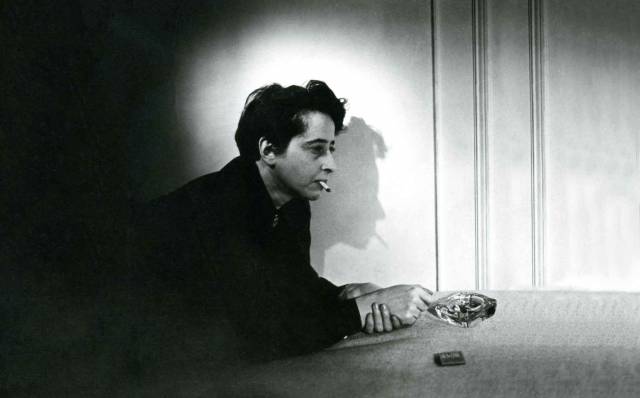
 Political theorist Hannah Arendt cuts a striking figure. In a rare 1964 German television interview and in selected stills, her physical profile summons the shadows. A succession of cigarettes aid her unvarnished demeanor with a noirish, vaporous finish. Born in 1906 in Königsberg to an assimilated German Jewish family, Arendt's pragmatic nature had already reared its smoky head by the time her father died. Aged seven, she informed her remaining, grieving parent that, "Mother, it happens to so many women." Studying philosophy under Martin Heidegger, the steely eyed young woman and her tutor would embark on a love affair. Both would become controversial figures in history, he because of his support for the Nazi Party and she for a body of work that would challenge the perception of evil.
Political theorist Hannah Arendt cuts a striking figure. In a rare 1964 German television interview and in selected stills, her physical profile summons the shadows. A succession of cigarettes aid her unvarnished demeanor with a noirish, vaporous finish. Born in 1906 in Königsberg to an assimilated German Jewish family, Arendt's pragmatic nature had already reared its smoky head by the time her father died. Aged seven, she informed her remaining, grieving parent that, "Mother, it happens to so many women." Studying philosophy under Martin Heidegger, the steely eyed young woman and her tutor would embark on a love affair. Both would become controversial figures in history, he because of his support for the Nazi Party and she for a body of work that would challenge the perception of evil.
In Ada Ushpiz' documentary Vita Activa: The Spirit of Hannah Arendt, distributed by Zeitgeist Films who, incidentally, were responsible for the US distribution of the 2012 biopic Hannah Arendt, a collection of interviews with Arendt's supporters, critics and those that knew her, are balanced with often breathtaking archival footage. The pre-storm interwar calm of Western Europe, a smiling German family casually raising the Nazi flag, Jewish refugees arriving in New York City, fascist propagandist film clips, a jovial group of men constructing a concentration camp, and at the close of WWII, an aerial view of flattened Berlin and the evident distress of German civilians, forced by the Allies into confronting the emaciated pile-up of death camp corpses.
Imprisoned by the Gestapo in 1933, Arendt would go on to experience refugee status in a Vichy regime French internment camp, before arriving in New York in 1941. Among her published work, it is Eichmann in Jerusalem: A Report on the Banality of Evil, originally reportage for The New Yorker, that is her most controversial. Present at Adolph Eichmann's 1961 trial in Jerusalem for his leading role in organizing the Holocaust, Arendt interpreted the "evil" lurking within the "desk murderer", like so many others of his ilk, to be the propensity of ordinary people to knuckle under and follow orders (much like the results of Stanley Milgram's obedience experiments at Yale, inspired by Arendt's findings). Critical of the legal proceedings, Arendt perceived the whole history of antisemitism to be on trial.
In Ushpiz' documentary footage, the Eichmann trial reveals a man whom unlike Arendt, could easily fade into his own shadow. He listens compliantly to his pre-recorded admissions which allude to a temperate mien, and to the derisive laughter of the courtroom at his denial of being an antisemite. In a clip from her televised 1964 interview, Arendt says of him: “His inability to speak was connected to his inability to think.” Arendt's "banality of evil" argument won her many enemies. Accused of being anti-Zionist, she was ostracized by significant circles within the Jewish community, helped in no part by her rekindled association with Heidegger.
Besides being a personal study of a woman bound to her legacy by historic events, the weaving of 20th century footage into the fabric of the film is mesmeric. In a world awash with modified terrorism and refugee crises, Vita Activa: The Spirit of Hannah Arendt is potent and timely. It is a fascinating film about a fascinating woman.